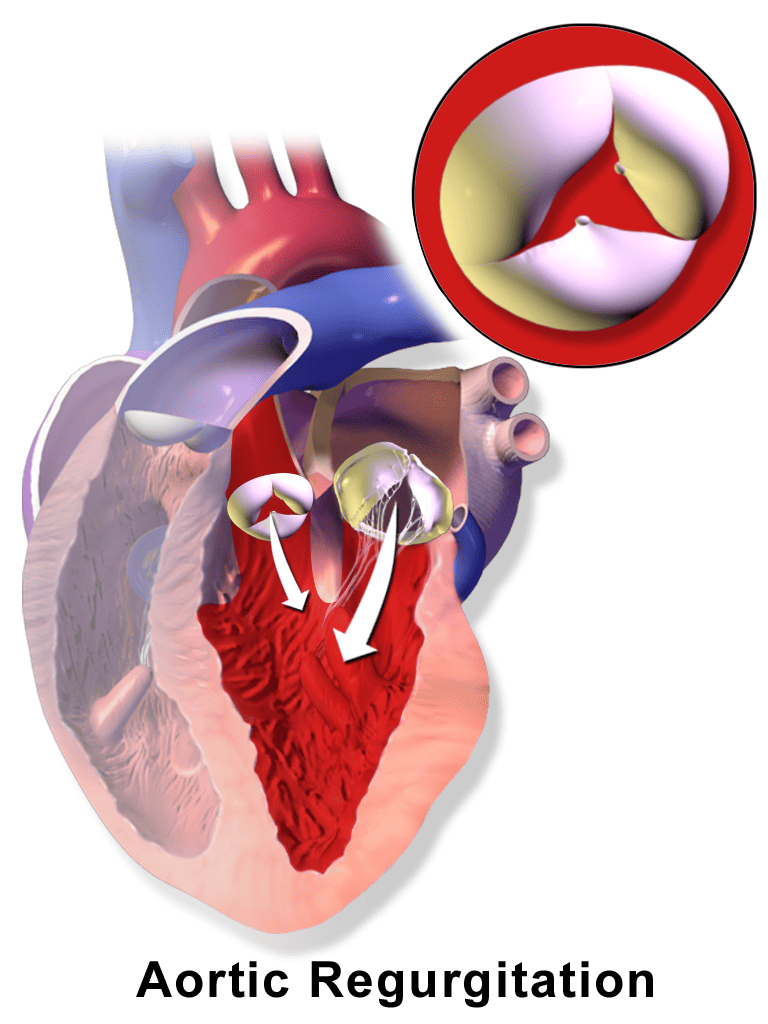Within the heart’s intricate network, the valves play a pivotal role in ensuring blood flows in the right direction. Aortic valve regurgitation is a condition that disrupts this harmony, having a cascade effect on one’s overall heart health. Let’s dive deep into understanding this cardiac condition.
What is Aortic Valve Regurgitation
Aortic valve regurgitation, often referred to as aortic insufficiency or aortic valve incompetence, is a condition where the heart’s aortic valve doesn’t close tightly. This malfunction allows some of the blood that was pumped out of the heart’s main pumping chamber (left ventricle) to leak back into it.
Overview
The heart thrives on a systematic rhythm and flow. The aortic valve’s duty is to ensure that once the blood is pumped from the left ventricle into the aorta (the main large artery that carries oxygen-rich blood to the body), no blood returns back. Regurgitation disrupts this system, compelling the heart to work harder to supply the required amount of blood to the body. Over time, this can weaken the heart and lead to symptoms and complications if not addressed.
Symptoms
For many individuals, aortic valve regurgitation is a silent ailment, presenting no symptoms for years. However, as the condition progresses or if it’s acute, symptoms may include:
- Fatigue, especially during increased physical activity.
- Shortness of breath.
- Swollen ankles and feet.
- Chest pain or palpitations.
- Lightheadedness or fainting.
Causes
There are myriad reasons why one might develop aortic valve regurgitation:
- Age-related Wear and Tear: As age advances, the valve can naturally begin to deteriorate.
- Congenital Heart Valve Disease: Some individuals are born with an aortic valve that has only two cusps (bicuspid valve) instead of the usual three, predisposing them to regurgitation.
- Endocarditis: This is an infection within the heart that can involve the valves.
- Rheumatic Fever: This complication of untreated strep throat can damage the aortic valve.
- Other Causes: These might include trauma to the valve, aortic dissections, or side effects from certain medications and radiation treatments.
Risk Factors
Certain conditions and attributes can increase the likelihood of developing aortic valve regurgitation:
- Age: Wear and tear of the valve is a natural progression with age.
- Endocarditis: Those who have had this heart infection are at a heightened risk.
- Rheumatic Fever History: Past instances of this condition can put one at risk.
- Congenital Heart Disorders: Being born with heart issues can predispose one to valve problems later in life.
- Certain Diseases: Conditions that can damage the aorta, such as Marfan syndrome or ankylosing spondylitis, can increase risk.
Avoidance and Prevention
While not all instances of aortic valve regurgitation can be avoided, certain steps can minimize the risk:
- Promptly Treat Strep Throat: Addressing this condition can prevent rheumatic fever.
- Regular Check-ups: Those with known heart conditions should have routine heart evaluations.
- Avoid Infections: Good dental hygiene and avoiding intravenous drug use can prevent endocarditis.
- Healthy Lifestyle Choices: Maintaining optimal weight, regular exercise, and a balanced diet can keep the heart robust.
When to Seek Medical Attention
One must not neglect symptoms that might be indicative of aortic valve regurgitation. If there’s unexplained fatigue, shortness of breath, or chest discomfort, it warrants medical evaluation. Moreover, individuals with a known valve condition or those at high risk should have routine cardiac check-ups.
Further Insights
Diagnosis typically involves a thorough medical history evaluation, physical examination, and tests like echocardiograms, MRI, or EKG. While mild regurgitation might not require treatment, more severe cases can necessitate medication or even surgical interventions, such as valve repair or replacement.
For those diagnosed with aortic valve regurgitation, regular follow-ups are crucial to monitor the condition and ensure that it’s not progressing. Even if there are no symptoms, unchecked regurgitation can lead to irreversible heart damage over time.
Aortic valve regurgitation, while potentially silent in its early stages, can have profound implications for heart health. Awareness, timely medical intervention, and a proactive approach to health are pivotal in managing this condition. The heart, after all, is not just an organ; it’s the very rhythm of life.


